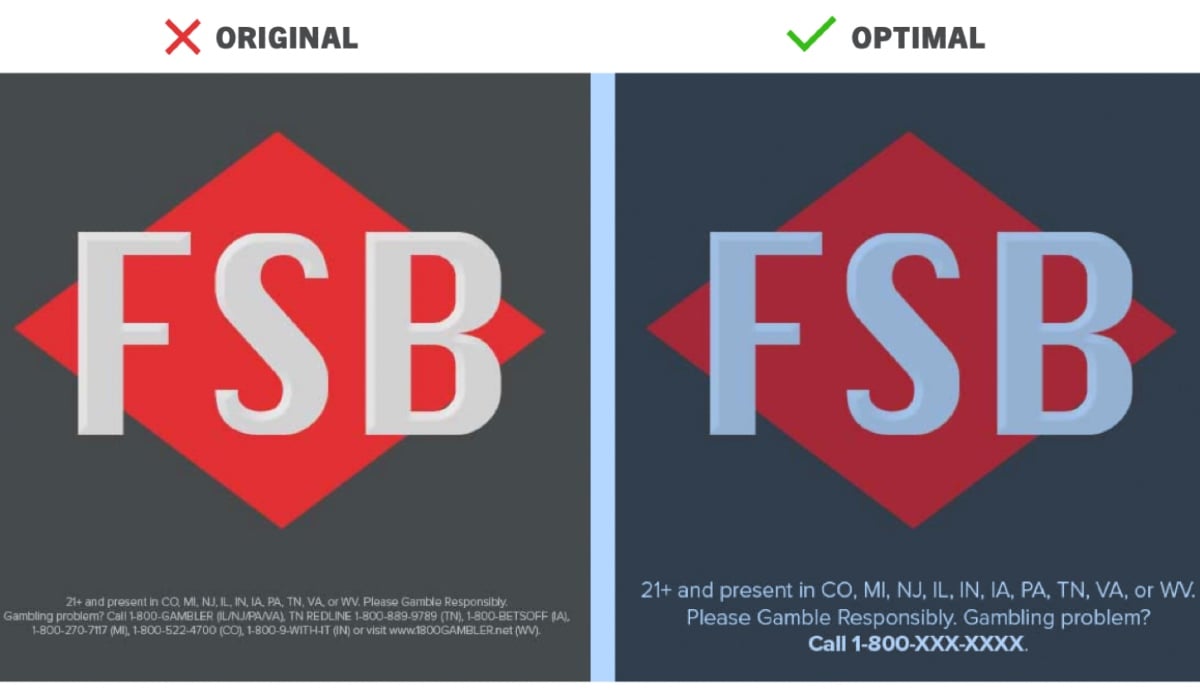Casino Lobbying Group Calls for Responsible Gaming Reforms
Posted on: August 3, 2021, 01:30h.
Last updated on: August 3, 2021, 02:27h.
The leading casino lobbying group in the United States is calling on the industry to implement better practices to promote responsible gaming.

The American Gaming Association (AGA) issued various recommendations today that the organization believes will better protect players. The guidance is tailored towards providing resources for those who are seeking help to curb their gambling behaviors.
The AGA says the small print located at the bottom of gambling advertisements has become muddied with state regulations and resources. As a result, the typeface today is small and difficult to read.
Instead of listing numerous numbers and resources, the AGA says the industry would better serve at-risk individuals by embracing one single helpline.
“Problem gambling helplines are a vital resource for those in need of help. Unfortunately, lengthy lists of state-specific helplines on national advertisements create barriers for those seeking help, when we should be making these critical resources easily accessible,” opined AGA Vice President of Government Relations and Gaming Policy Counsel Jessica Feil.
Allowing the use of a national helpline in national advertising is the most effective way to protect players,” Feil declared.
Founded in 1994 and headquartered in the nation’s capital, the AGA lobbies policymakers on behalf of the best interests of the gaming industry.
Googling Gambling Help
Currently, the US gaming industry as a whole does not embrace a standard helpline for gambling problems.
An online search turned up 1-800-GAMBLER, something that might seem to be a national help program. But that number is reserved for individuals seeking assistance in Illinois, New Jersey, Pennsylvania, Virginia, and West Virginia.
Other state-specific gambling hotlines include 1-800-889-9789 in Tennessee, 1-800-BETSOFF in Iowa, 1-800-270-7117 in Michigan, 1-800-522-4700 in Colorado and Nevada, and 1-800-9-WITH-IT in Indiana. The National Council on Problem Gambling’s helpline is 1-800-522-4700.
Depending on the nature and distribution of the ad, casino and sportsbook entities are required to include certain resources and their contact phone numbers.
“Multiple helpline numbers cause consumer confusion, since many problem gamblers may not know which number is the appropriate number to call,” the AGA policy sheet explains. “For example, is it based on where they reside or where they are gambling?”
Get With Times
The AGA adds that a central, nationwide help center should provide diverse technological resources. The days of a toll-free number being ideal have long expired, the group argues.
Calling it an “outdated offering,” the AGA asserts that requiring problem gamblers to use a call-in helpline overlooks more modern services used for crisis assistance, such as text messaging and online chat support.
Though only an estimated one to three percent of US adults meet the criteria to be classified as having at least a mild gambling problem, the industry devotes hundreds of millions of dollars annually to treatment initiatives. The money is used to develop and incorporate responsible gaming policies, manage self-exclusion programs, fund treatment and research, and train employees.
Related News Articles
Most Popular
FTC: Casino Resort Fees Must Be Included in Upfront Hotel Rates
Genovese Capo Sentenced for Illegal Gambling on Long Island
NBA Referees Expose Sports Betting Abuse Following Steve Kerr Meltdown
UPDATE: Former Resorts World & MGM Grand Prez Loses Gaming License
Most Commented
-
UPDATE: Whiskey Pete’s Casino Near Las Vegas Closes
— December 20, 2024 — 30 Comments -
Caesars Virginia in Danville Now Accepting Hotel Room Reservations
— November 27, 2024 — 9 Comments -
UPDATE: Former Resorts World & MGM Grand Prez Loses Gaming License
— December 19, 2024 — 8 Comments -
FTC: Casino Resort Fees Must Be Included in Upfront Hotel Rates
— December 17, 2024 — 7 Comments
















Last Comment ( 1 )
Responsible Gambling? Is that an Oxymoron ? Gambling is all about taking chances that a person who is responsible would not dare to do. If there was no risk everyone would do it.